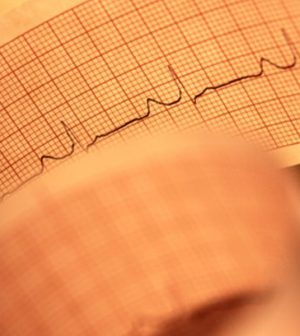- Could Your Grocery Store Meat Be Causing Recurring UTIs?
- Are You Making This Expensive Thermostat Error This Winter?
- Recognizing the Signs of Hypothyroidism
- 10 Strategies to Overcome Insomnia
- Could Artificial Sweeteners Be Aging the Brain Faster?
- Techniques for Soothing Your Nervous System
- Does the Water in Your House Smell Funny? Here’s Why
- Can a Daily Dose of Apple Cider Vinegar Actually Aid Weight Loss?
- 6 Health Beverages That Can Actually Spike Your Blood Sugar
- Treatment Options for Social Anxiety Disorder
A-Fib Can Raise Dementia Risk, Even in Absence of Stroke

Many aging Americans have the common heart rhythm disorder known as atrial fibrillation, or “a-fib.” Now comes the sobering news that it might raise their odds for dementia.
The Korean study couldn’t prove cause and effect, but researchers noted that the link between a-fib and dementia was found even among people who hadn’t suffered a stroke. A-fib is a known and potent risk factor for a stroke.
“We found that the people who developed atrial fibrillation had a 50% increased risk of developing dementia compared to those who did not develop the condition; this increased risk remained even after we removed those who suffered a stroke from our calculations,” said study leader Boyoung Joung. He’s professor of cardiology and internal medicine at Yonsei University College of Medicine in Seoul, South Korea.
“This means that, among the general population, an extra 1.4 people per 100 of the population would develop dementia if they were diagnosed with atrial fibrillation. The risk occurred in people aged younger and older than 70 years,” Joung explained in a news release from the European Heart Journal. The journal published the new findings June 18.
Finally, Joung said, “we also found that atrial fibrillation increased the risk of Alzheimer’s disease by 30% and more than doubled the risk of vascular dementia.”
There was one bit of good news from the study, however: People with a-fib who took blood thinners to help prevent a stroke also appeared to reduce their risk for dementia, compared to those who didn’t.
One U.S. physician who often treats patients with a-fib wasn’t surprised by the new findings.
“We know that as people age, the chance of developing atrial fibrillation increases, as does the chance of developing dementia,” said Dr. Marcin Kowalski. He directs cardiac electrophysiology at Staten Island University Hospital in New York City.
“Atrial fibrillation impacts brain function through many different pathways,” Kowalski said. First, because it can directly trigger a stroke; and second, because the drugs used to treat a-fib can sometimes cause brain “bleeds.”
The new study included nearly 263,000 South Koreans, aged 60 and older, who were all free of a-fib and dementia when the study began in 2004. During follow-up lasting until the end of 2013, a-fib was diagnosed in more than 10,400 of the participants.
During the same time-frame, dementia was also diagnosed in about 24% of those with a-fib, compared with 14% of those without a-fib, Joung’s group found.
“However, among people who developed atrial fibrillation and who took [blood thinners] — such as warfarin [Coumadin] or non-vitamin K anticoagulants, such as dabigatran [Pradaxa], rivaroxaban [Xarelto], apixaban [Eliquis] or edoxaban [Savaysa] — the risk of subsequently developing dementia was reduced by 40%, compared to patients who did not take [blood thinners],” Joung said.
Due to the size and length of the study, “we can be sure of our findings,” co-author Gregory Lip, professor of cardiovascular medicine at the University of Liverpool in England, added in the news release.
“We also believe that our results can apply to other populations, too, as they confirm similar findings of a link between atrial fibrillation and dementia in studies of people in Western and European countries,” said Lip, who is also an adjunct professor at Yonsei University College of Medicine.
Dr. Laurence Epstein is system director of electrophysiology at Northwell Health in Manhasset, N.Y. He agreed that a-fib is a likely contributor to dementia, but its effects can be minimized.
Besides major stroke, “multiple ‘mini,’ asymptomatic strokes have been known to cause dementia,” Epstein noted. However, the use of blood thinners to counter the threat “has become much simpler and safer with the new agents, such as Eliquis and Xarelto.”
Epstein believes that the new findings highlight the importance of that type of treatment, and will help “drive better compliance by patients and physicians alike.”
More information
The U.S. National Heart, Lung, and Blood Institute has more on a-fib.
Source: HealthDay
Copyright © 2026 HealthDay. All rights reserved.










